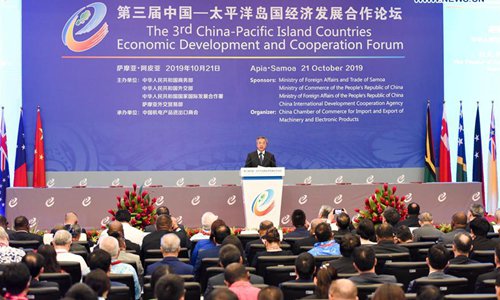
Chinese Vice Premier Hu Chunhua attends the opening ceremony and delivers a congratulatory message from Chinese President Xi Jinping at the 3rd China-Pacific Island Countries Economic Development and Cooperation Forum in Apia, Samoa, on October 21. Photo: Xinhua
The third China-Pacific Island Countries Economic Development and Cooperation Forum was held on October 21 in Apia, the capital city of Samoa. The two sides explored more cooperation opportunities in a variety of fields including infrastructure, trade, environmental protection, agriculture and tourism.
Unsurprisingly, some Western media and observers attempted to hype up "debt-trap diplomacy." Lowy Institute, an independent think tank based in Sydney, issued a report entitled "Ocean of debt? Belt and Road and debt diplomacy in the Pacific" on the same day the forum was held, saying "important questions about the risk of debt problems in less-developed countries" have been raised because of their cooperation with China, adding "the risks are especially acute for the small and fragile economies of the Pacific." This reflects Australia's vigilance against China as well as its consistent condescending arrogant attitude toward Pacific island countries.
Chinese President Xi Jinping visited Papua New Guinea (PNG) in November 2018, met with Pacific island leaders and promoted bilateral relations with PNG to a new comprehensive strategic partnership featuring mutual respect and common development. Under the guidance, ties between China and Pacific island countries have reached substantial progress in 2019.
On April 1, the 2019 Year of Tourism for China and Pacific Island Countries was launched in Apia. In September, the Solomon Islands and Kiribati ended their "diplomatic" relations with Taiwan and respectively established and restored ties with the Chinese mainland. China and Pacific island countries have maintained close communication and cooperation on issues such as climate change and sustainable development. It is no exaggeration to say that 2019 is the year of China-South Pacific ties in terms of China's diplomacy.
Pacific island countries are small but smart. They are fully capable of exploring and finding a development path that suits them. The cooperative concept of mutual respect and common development is in line with their wish when it comes to foreign relations.
Over the past decade, China has become the largest export destination for many of the Pacific island countries given their economic complementarities. Take the Solomon Islands. "According to the World Bank, in 2017, the Solomon Islands exported $554.8 million worth of commodities, or two-thirds of its total exports, to China," reported The Diplomat on October 18. The establishment of diplomatic relations between the two countries will undoubtedly further boost their bilateral trade and the Chinese market is apparently attractive to island countries, which are seeking independent development.
Under the framework of South-South cooperation and the China-proposed Belt and Road Initiative (BRI), China has provided development assistance within its power to the islands as well as experiences including "to get rich, build roads first." In addition to infrastructural collaboration, China has also strengthened cooperation with the island countries in agricultural technologies, introducing the techniques of planting fungus, bamboo and other vegetables. The China scholarship program, Confucius Institutes and medical services in the region have further improved people-to-people connections between China and these Pacific island countries.
Improving friendly ties with China is the choice of people from Pacific island countries. China has made its efforts to win those countries' respect. For instance, on issues of climate change and sustainable development, China has taken effective actions, which echo the concerns of the island countries.
When facing Western countries, including Australia's hype that China is a geostrategic competitor, leaders from Pacific island countries have spoken out from a sense of justice. In August, Samoan Prime Minister Tuilaepa Malielegaoi said that island countries won't line up with Australia and the US against China, declaring "their enemies are not our enemies," The Australian reported. Malielegaoi added that "[The Pacific's] only interest is to provide the kind of modern living, decent kind of modern living, of our people," and if countries "against China" did not approve of Beijing's influence in the region "they should come in and provide the assistance that China is providing."
When PNG's Prime Minister James Marape visited Australia in July and was asked questions about China, Marape articulated that PNG's overall position on foreign policy is being "friends to all and enemies to none." Fiji's Parliament Speaker Ratu Epeli Nailatikau hailed the BRI in March, saying that many countries will benefit from this great initiative.
Australia has been the largest donor in the Pacific islands region. It is geographically close to them with wide and deep social connections. Other countries are no match for these advantages. However, Australia should respect the countries' own choices, instead of being arrogant on their decisions and moves. Canberra should accept and be happy about the fact that Pacific island countries will have a wider development path and more opportunities, rather than completely depending on Australia's assistance. Australia should not keep holding the countries as its own backyard.
The author is a senior researcher of Taihe Institute. opinion@globaltimes.com.cn
—————————————————————
ON TIMES WE FOCUS.
Should you have any questions, please contact us at public@taiheglobal.org
